UK Speed Cameras RIP?
As a “victim” of the UK’s anti-speeding jihad, I’ve been watching their “safety camera” campaign with morbid fascination. Here you have a reasonably democratic government unleashing a mega-tsunami of electronic surveillance to curb a behavior practiced by the vast majority of its populace. The results have been staggering: millions of licenses imperiled or revoked, tens of millions in pounds in fines collected, no appreciable diminution of violations and no increase in road safety. And yet, the jihadists remain determined to carry on. So when speed camera opponents launched a “scrapcam” petition, I expected a groundswell of support. Silly me.
Last November, as part of [former] Prime Minister Tony Blair’s commitment to web-based accountability, the UK government launched an online petition-posting widget. In February, an anti-camera group called Safe Speed uploaded a petition calling for the Prime Minister to “scrap speed cameras.” Their one-paragraph call to action characterized speed cameras as a lousy landing at the wrong airport.
“Far from making our roads safer, speed cameras have replaced genuine life saving policies and distracting everyone from more important safety factors. Instead… -We must have road safety policies based on skills, attitudes and responsibilities… We must avoid needlessly prosecuting skilled and responsible drivers driving safely – We must measure what is important, not make important that which is easily measured – and you can't measure safe driving in miles per hour."
On Tuesday, the petition closed, with some 28k signatures collected. Speaking to us today from London, Safe Speed’s founder pronounced himself pleased with the results. “Considering we had no publicity, it was a good showing” Paul Smith asserted. “Of the 7,700 petitions online, ours was the seventh most signed.”
Smith is not so happy with the government’s response. The officials sent every signatory an email that attempted to ameliorate their concerns. Smith considers it patently unfair that the government should have the last word, and not allow petitioners to email signatories who agree to such contact. In fact, he’s “ABSOLUTELY LIVID” that 10 Downing Street sent out an “inaccurate and grossly misleading” rebuttal.
Safe Speed responded with a press release tearing apart the government’s pro-camera argument piece by bloody piece. Here's a small sample of their evisceration [Safe Speed’s answers indicated by an asterisk]:
Speeding kills. It is a contributory factor in 26% of all fatal accidents in Great Britain.
* No it isn't. According to Department for Transport figures exceeding a speed limit it is a contributory factor in 12% of fatal crashes. We know that many of those are caused by reckless and 'abnormal' driver behaviour.
The facts are stark. If a child pedestrian is hit at 30mph they stand an 80% chance of surviving. But if they are hit at 40mph they stand an 80% chance of dying. That is why the Government is committed to achieving appropriate vehicle speeds on the roads as part of its integrated road safety strategy.
* The true facts are more encouraging. In 2005 in built up areas (20, 30 and 40 mph speed limits) 11,000 child pedestrians were injured out of which 47 were killed. 0.42% were killed. So clearly we're not running into them at 'speed limit' speeds because at 30mph we would have killed 2,200. The claim is grossly misleading.
Independent research published in December 2005 shows that safety cameras had saved around 1,745 people from being killed or seriously injured, and had prevented around 4,230 personal injury collisions on Britain's roads each year.
* That very same report reveals – buried in appendix h – that 'regression to mean effect' accounts for a full three quarters of the benefit claimed. To make the claim while ignoring the known error is nothing less than a FRAUD.
Clearly, Smith and his cohorts know their onions. Not so clearly, their campaign is gaining ground.
On the first of April, the Department of Transportation officially disowned the speed camera policy. They transferred all responsibility for the scheme’s implementation to regional authorities, giving them the freedom to amp-up or ditch the entire policy as they see fit. Equally importantly, a seven-year case against speed cameras at the European Court of Human Rights is set to be resolved tomorrow.
The case was brought by UK resident Idris Francis. Francis’ briefs argued that the UK government does not have the right to legally compel Mr. Francis to identify the driver of his vehicle at the time it was captured speeding by a “safety camera.” The demand violates his legal protection against self-incrimination.
According to Smith, if the European court strikes down the ticket (believe it or not), that’s it: speeding camera prosecutions will no longer be viable. And if it doesn’t? I mean… 28k supporters ain't much. Safe Speed's 52-year-old engineer turned road safety campaigner is resolute. “We’ll still be here, fighting this dangerous policy to the very end. It’s only a matter of time.”
More by Robert Farago
Latest Car Reviews
Read moreLatest Product Reviews
Read moreRecent Comments
- MaintenanceCosts Poorly packaged, oddly proportioned small CUV with an unrefined hybrid powertrain and a luxury-market price? Who wouldn't want it?
- MaintenanceCosts Who knows whether it rides or handles acceptably or whether it chews up a set of tires in 5000 miles, but we definitely know it has a "mature stance."Sounds like JUST the kind of previous owner you'd want…
- 28-Cars-Later Nissan will be very fortunate to not be in the Japanese equivalent of Chapter 11 reorganization over the next 36 months, "getting rolling" is a luxury (also, I see what you did there).
- MaintenanceCosts RAM! RAM! RAM! ...... the child in the crosswalk that you can't see over the hood of this factory-lifted beast.
- 3-On-The-Tree Yes all the Older Land Cruiser’s and samurai’s have gone up here as well. I’ve taken both vehicle ps on some pretty rough roads exploring old mine shafts etc. I bought mine right before I deployed back in 08 and got it for $4000 and also bought another that is non running for parts, got a complete engine, drive train. The mice love it unfortunately.



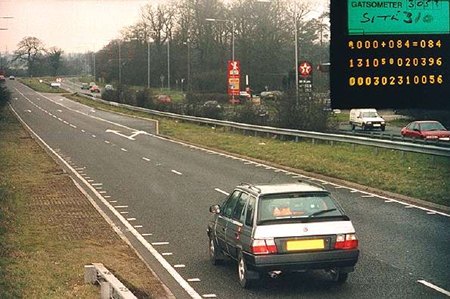















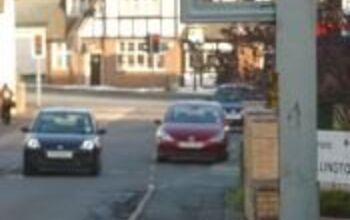
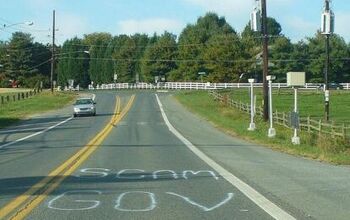

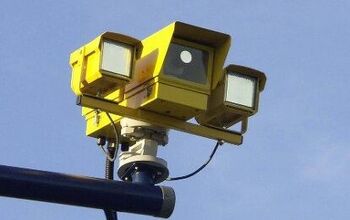
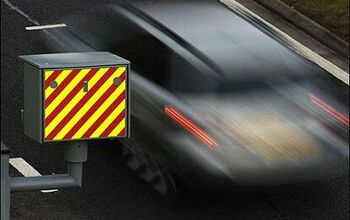








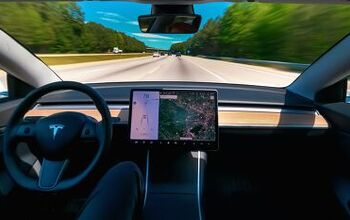
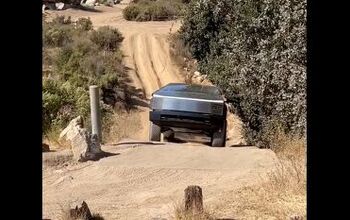
Comments
Join the conversation
Six US State Supreme Courts (Arkansas, Nevada, New Jersey, Utah, West Virginia, and most recently North Carolina) have ruled that the use of traffic cameras are unconstitutional, as you must identify and incriminate yourself, you are considered guilty until proven innocent, and you cannot face your accuser and/or witnesses (the camera) in court. Further, they found that since in most cases, the company or municipality operating the cameras had a vested economic interest in the outcome of the production of evidence leading to citations and convictions, all evidence supplied was suspect and there was the appearance of bias and impropriety.
My intention here is not to break the TTAC TOS by flaming Mr Farago, but why are TTAC pages going down the path of "the UK's anti-speeding jihad?" Our little hobby of fast cars has this intrinsic disconnect with social order - we sit here and analyze, debate and wax poetically about how modern cars handle, hoon and hammer down, but when auto journalists or Hero Cam YouTube-rs show off the same characteristics we talk about continually on a public road, we begin speaking about criminal indictments? We could continue the congnitive dissodance of saying that people buy Ferraris, Porsches, Black Edition Mercs, BMW Ms and Audi RSs (...etc) so that they can go to track days but who are we kidding? Real track day addicts can go out and spend a fraction of the cost of one of the latest-n-greatest road rockets and buy a Radical, Arial, Forumla car or previous gen exotic with the streety bits ripped out. All the track action + more safety + higher performance + no risking the $$$ grocery getter = better idea then tracking your $70K E90 M3 daily driver. Hooning through traffic is one thing where I think the vast majority of us will agree is probably a bad idea (even though I am assuming we've all done it when we were young and dumb). Driving a fast car fast on empty, lifeless, public roads where - beyond a shadow of a doubt - the only lives at risk are those of willing participants... where exactly is the problem? I don't know when it happened, but we have conflated the idea of justice with dogmatic, rigid adherence to codified law. They are two very different things. Speed laws are intended to keep roads safe for travel by the entire community. When that community is at zero risk, I don't see the need to crucify folks for breaking codified laws.